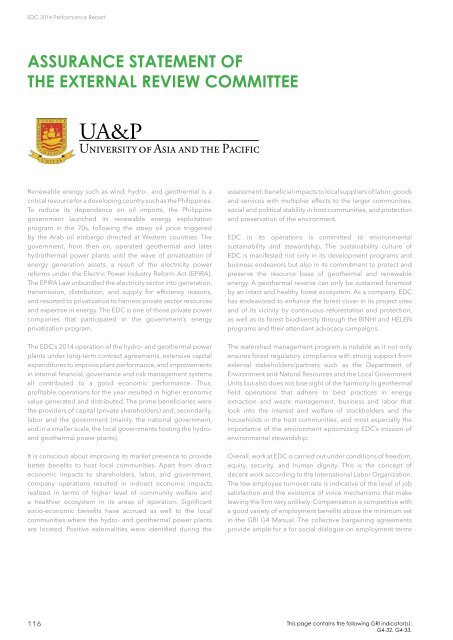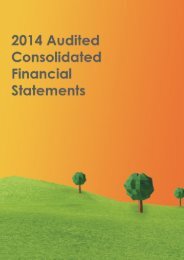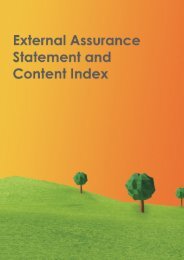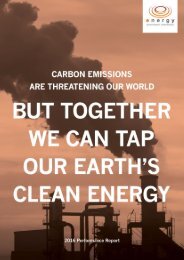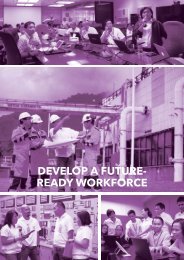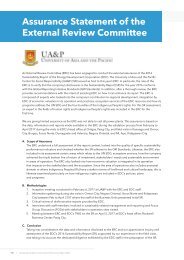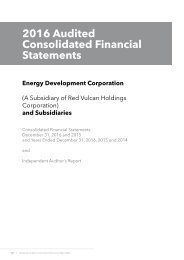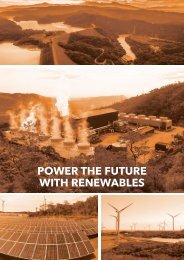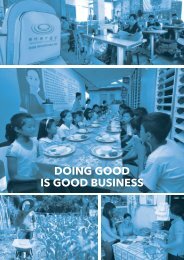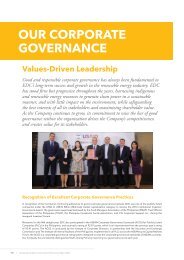EDC 2014 SR (UPDATED)
You also want an ePaper? Increase the reach of your titles
YUMPU automatically turns print PDFs into web optimized ePapers that Google loves.
<strong>EDC</strong> <strong>2014</strong> Performance Report<br />
Assurance Statement of<br />
the external review committee<br />
University of Asia and the Pacific<br />
Renewable energy such as wind, hydro-, and geothermal is a<br />
critical resource for a developing country such as the Philippines.<br />
To reduce its dependence on oil imports, the Philippine<br />
government launched its renewable energy exploitation<br />
program in the 70s, following the steep oil price triggered<br />
by the Arab oil embargo directed at Western countries. The<br />
government, from then on, operated geothermal and later<br />
hydrothermal power plants until the wave of privatization of<br />
energy generation assets, a result of the electricity power<br />
reforms under the Electric Power Industry Reform Act (EPIRA).<br />
The EPIRA Law unbundled the electricity sector into generation,<br />
transmission, distribution, and supply for efficiency reasons,<br />
and resorted to privatization to harness private sector resources<br />
and expertise in energy. The <strong>EDC</strong> is one of those private power<br />
companies that participated in the government’s energy<br />
privatization program.<br />
The <strong>EDC</strong>’s <strong>2014</strong> operation of the hydro- and geothermal power<br />
plants under long-term contract agreements, extensive capital<br />
expenditures to improve plant performance, and improvements<br />
in internal financial, governance and risk management systems<br />
all contributed to a good economic performance. Thus,<br />
profitable operations for the year resulted in higher economic<br />
value generated and distributed. The prime beneficiaries were<br />
the providers of capital (private shareholders) and, secondarily,<br />
labor and the government (mainly, the national government,<br />
and in a smaller scale, the local governments hosting the hydroand<br />
geothermal power plants).<br />
It is conscious about improving its market presence to provide<br />
better benefits to host local communities. Apart from direct<br />
economic impacts to shareholders, labor, and government,<br />
company operations resulted in indirect economic impacts<br />
realized in terms of higher level of community welfare and<br />
a healthier ecosystem in its areas of operation. Significant<br />
socio-economic benefits have accrued as well to the local<br />
communities where the hydro- and geothermal power plants<br />
are located. Positive externalities were identified during the<br />
assessment: beneficial impacts to local suppliers of labor, goods<br />
and services with multiplier effects to the larger communities,<br />
social and political stability in host communities, and protection<br />
and preservation of the environment.<br />
<strong>EDC</strong> in its operations is committed to environmental<br />
sustainability and stewardship. The sustainability culture of<br />
<strong>EDC</strong> is manifested not only in its development programs and<br />
business endeavors but also in its commitment to protect and<br />
preserve the resource base of geothermal and renewable<br />
energy. A geothermal reserve can only be sustained foremost<br />
by an intact and healthy forest ecosystem. As a company, <strong>EDC</strong><br />
has endeavored to enhance the forest cover in its project sites<br />
and of its vicinity by continuous reforestation and protection,<br />
as well as its forest biodiversity through the BINHI and HELEN<br />
programs and their attendant advocacy campaigns.<br />
The watershed management program is notable as it not only<br />
ensures forest regulatory compliance with strong support from<br />
external stakeholders/partners such as the Department of<br />
Environment and Natural Resources and the Local Government<br />
Units but also does not lose sight of the harmony in geothermal<br />
field operations that adhere to best practices in energy<br />
extraction and waste management, business and labor that<br />
look into the interest and welfare of stockholders and the<br />
households in the host communities, and most especially the<br />
importance of the environment epitomizing <strong>EDC</strong>’s mission of<br />
environmental stewardship.<br />
Overall, work at <strong>EDC</strong> is carried out under conditions of freedom,<br />
equity, security, and human dignity. This is the concept of<br />
decent work according to the International Labor Organization.<br />
The low employee turnover rate is indicative of the level of job<br />
satisfaction and the existence of voice mechanisms that make<br />
leaving the firm very unlikely. Compensation is competitive with<br />
a good variety of employment benefits above the minimum set<br />
in the GRI G4 Manual. The collective bargaining agreements<br />
provide ample for a for social dialogue on employment terms<br />
116<br />
This page contains the following GRI indicator(s):<br />
G4-32, G4-33.


